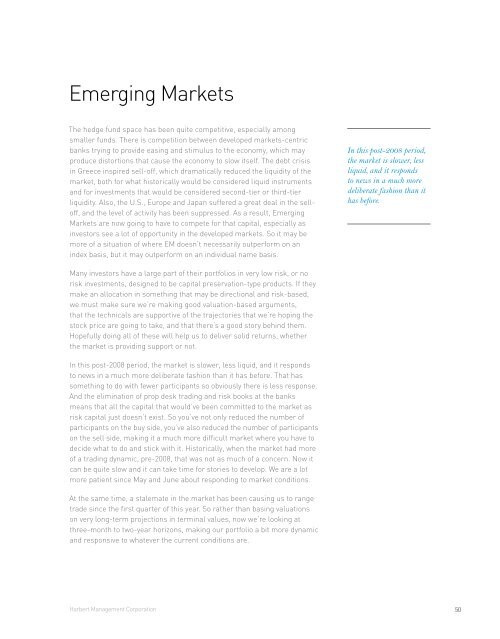2010 Annual Report - Harbert Management Corporation
2010 Annual Report - Harbert Management Corporation
2010 Annual Report - Harbert Management Corporation
Create successful ePaper yourself
Turn your PDF publications into a flip-book with our unique Google optimized e-Paper software.
Emerging Markets<br />
The hedge fund space has been quite competitive, especially among<br />
smaller funds. There is competition between developed markets-centric<br />
banks trying to provide easing and stimulus to the economy, which may<br />
produce distortions that cause the economy to slow itself. The debt crisis<br />
in Greece inspired sell-off, which dramatically reduced the liquidity of the<br />
market, both for what historically would be considered liquid instruments<br />
and for investments that would be considered second-tier or third-tier<br />
liquidity. Also, the U.S., Europe and Japan suffered a great deal in the selloff,<br />
and the level of activity has been suppressed. As a result, Emerging<br />
Markets are now going to have to compete for that capital, especially as<br />
investors see a lot of opportunity in the developed markets. So it may be<br />
more of a situation of where EM doesn’t necessarily outperform on an<br />
index basis, but it may outperform on an individual name basis.<br />
Many investors have a large part of their portfolios in very low risk, or no<br />
risk investments, designed to be capital preservation-type products. If they<br />
make an allocation in something that may be directional and risk-based,<br />
we must make sure we’re making good valuation-based arguments,<br />
that the technicals are supportive of the trajectories that we’re hoping the<br />
stock price are going to take, and that there’s a good story behind them.<br />
Hopefully doing all of these will help us to deliver solid returns, whether<br />
the market is providing support or not.<br />
In this post-2008 period, the market is slower, less liquid, and it responds<br />
to news in a much more deliberate fashion than it has before. That has<br />
something to do with fewer participants so obviously there is less response.<br />
And the elimination of prop desk trading and risk books at the banks<br />
means that all the capital that would’ve been committed to the market as<br />
risk capital just doesn’t exist. So you’ve not only reduced the number of<br />
participants on the buy side, you’ve also reduced the number of participants<br />
on the sell side, making it a much more difficult market where you have to<br />
decide what to do and stick with it. Historically, when the market had more<br />
of a trading dynamic, pre-2008, that was not as much of a concern. Now it<br />
can be quite slow and it can take time for stories to develop. We are a lot<br />
more patient since May and June about responding to market conditions.<br />
At the same time, a stalemate in the market has been causing us to range<br />
trade since the first quarter of this year. So rather than basing valuations<br />
on very long-term projections in terminal values, now we’re looking at<br />
three-month to two-year horizons, making our portfolio a bit more dynamic<br />
and responsive to whatever the current conditions are.<br />
in this post-2008 period,<br />
the market is slower, less<br />
liquid, and it responds<br />
to news in a much more<br />
deliberate fashion than it<br />
has before.<br />
<strong>Harbert</strong> <strong>Management</strong> <strong>Corporation</strong> 50




